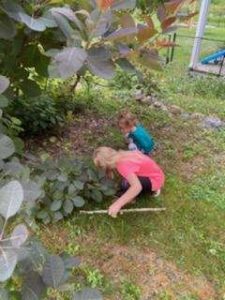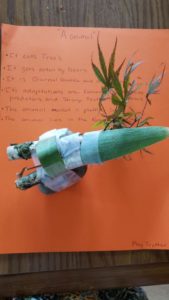Bringing Camp Home
For the last seven summer seasons, I have written the blog for this week with a view of Cedar Lake down at the Michigan Out-of-Doors Youth Camp. Today I am watching my dog “Cedar” try to figure out how to eat an ice cube from my “home office”. Typically this week kicks off the summer camp season with our staff training, teaching our group of 24 staff what will be expected of them during the 6-week summer season. The preparations of the facility would be happening and the fervent learning of curriculum to get ready for the waves of campers who would be joining us in a few days.
However, as most of you know, this year we have had to cancel our normal camp operations and there will be no waves of happy campers down at Cedar Lake. This year instead of leading staff on wild edibles hikes and teaching kayaking techniques, camp director Max Bass has been pouring over curriculum to come up with a way to connect youth and families to the outdoors while staying at home.
While there is absolutely no way to replace the magic of being part of a camp experience, there are still many things you can do locally to engage in the natural resources around you and learn some new skills. With that in mind, the MUCC education team (Max and I) have been working to create a “Camp-to-Go” curriculum.

The Camp-to-Go curriculum is a bundle of outdoor-related activities that we will mail to your family that is full of lessons and programs that your child might normally do at camp. Inside you will find a range of lessons, from instructions on what type of wildlife to look for on a night hike, to how to build a survival shelter and start a fire. Each bundle contains multiple program themes designed for youth of a variety of ages. These activities will follow our outdoor recreation and environmental education curriculum. They contain unique ways for your camper and family to enjoy the outdoors this summer.
Throughout the summer we will be sharing helpful videos to the youth camp Facebook page to coincide with the curriculum to explain concepts/instructions, highlight why conservation in Michigan is important and have a little bit of fun.

Create a critter lesson
The first group of Camp-to-Go bundles will be mailed out next week for people who have previously signed up. If you have not registered to receive, a packet you can reach out to Max Bass and we will put a bundle together and get it in the mail. These packets are available for families to purchase.
However, we know that due to the circumstances surrounding this summer, each family is in a different financial situation, and because of that, we are not putting a standard price on our Camp-to-Go packets. Rather, we are asking for donations to help cover the fixed costs of camp such as staff time and the shipping of the materials. If you would like more information on Camp-to-Go, please reach out to Camp Director Max Bass.
If you have, any questions do not hesitate to ask Max at mbass@mucc.org.
The post Bringing Camp Home appeared first on Michigan United Conservation Clubs.
Recent Posts



